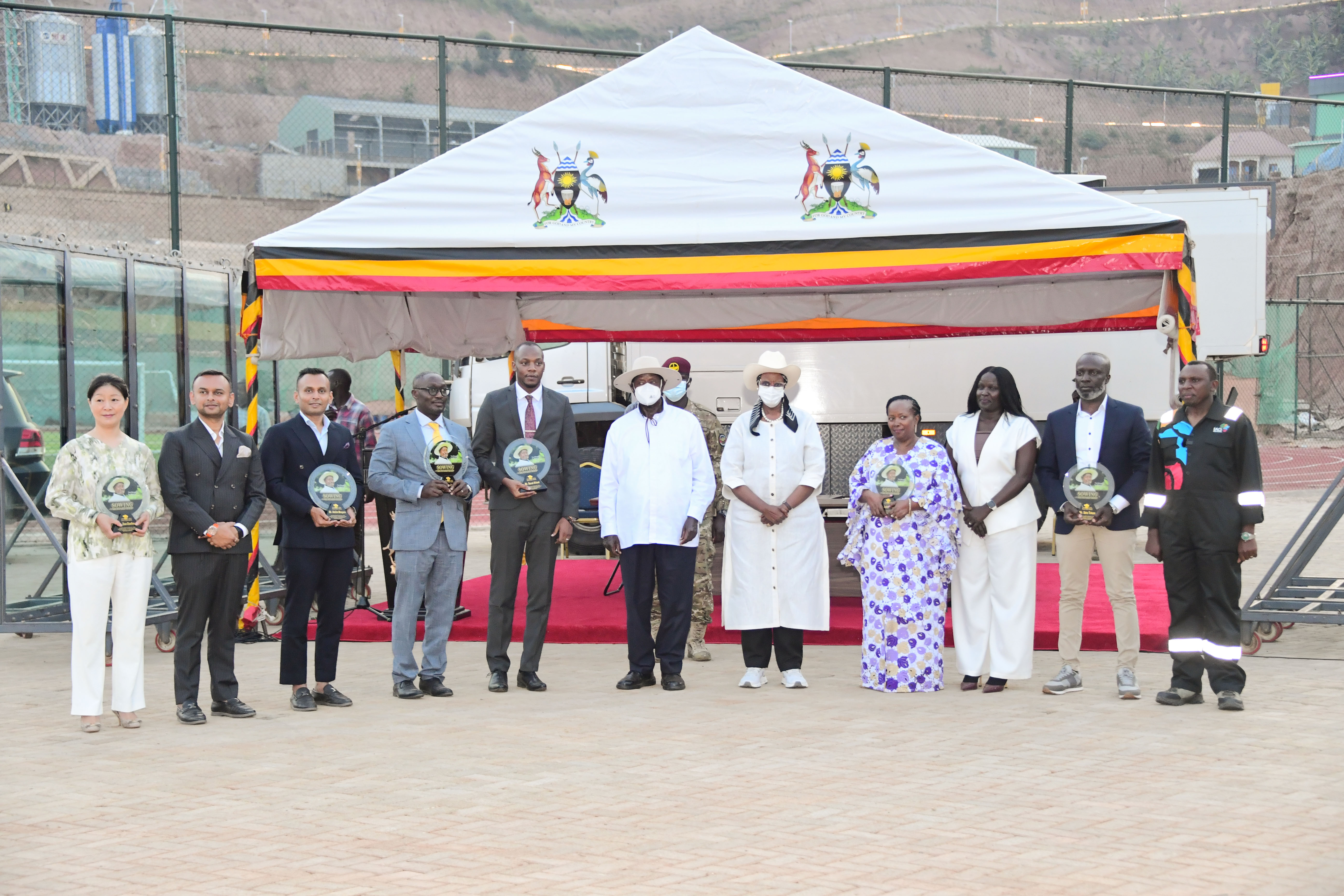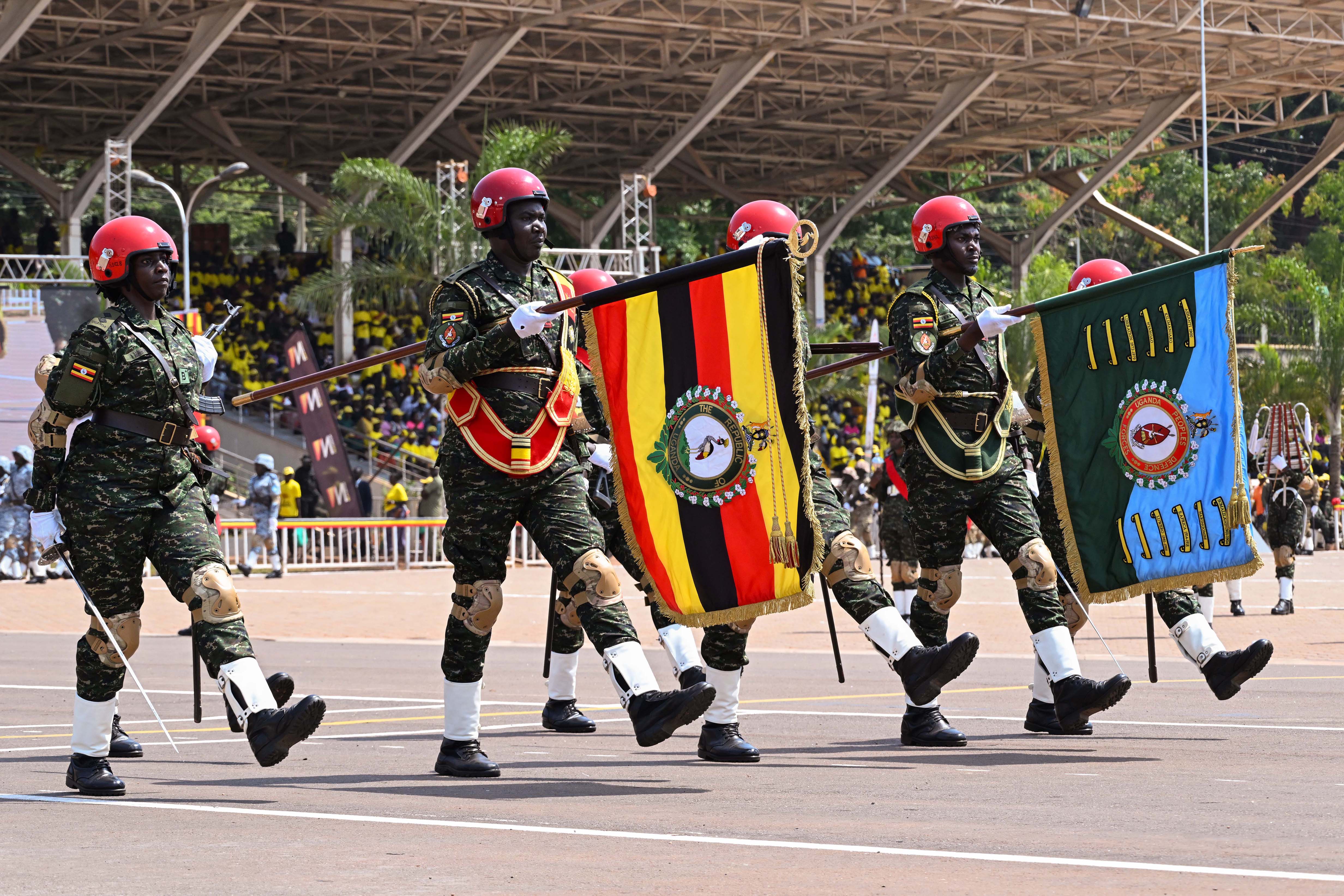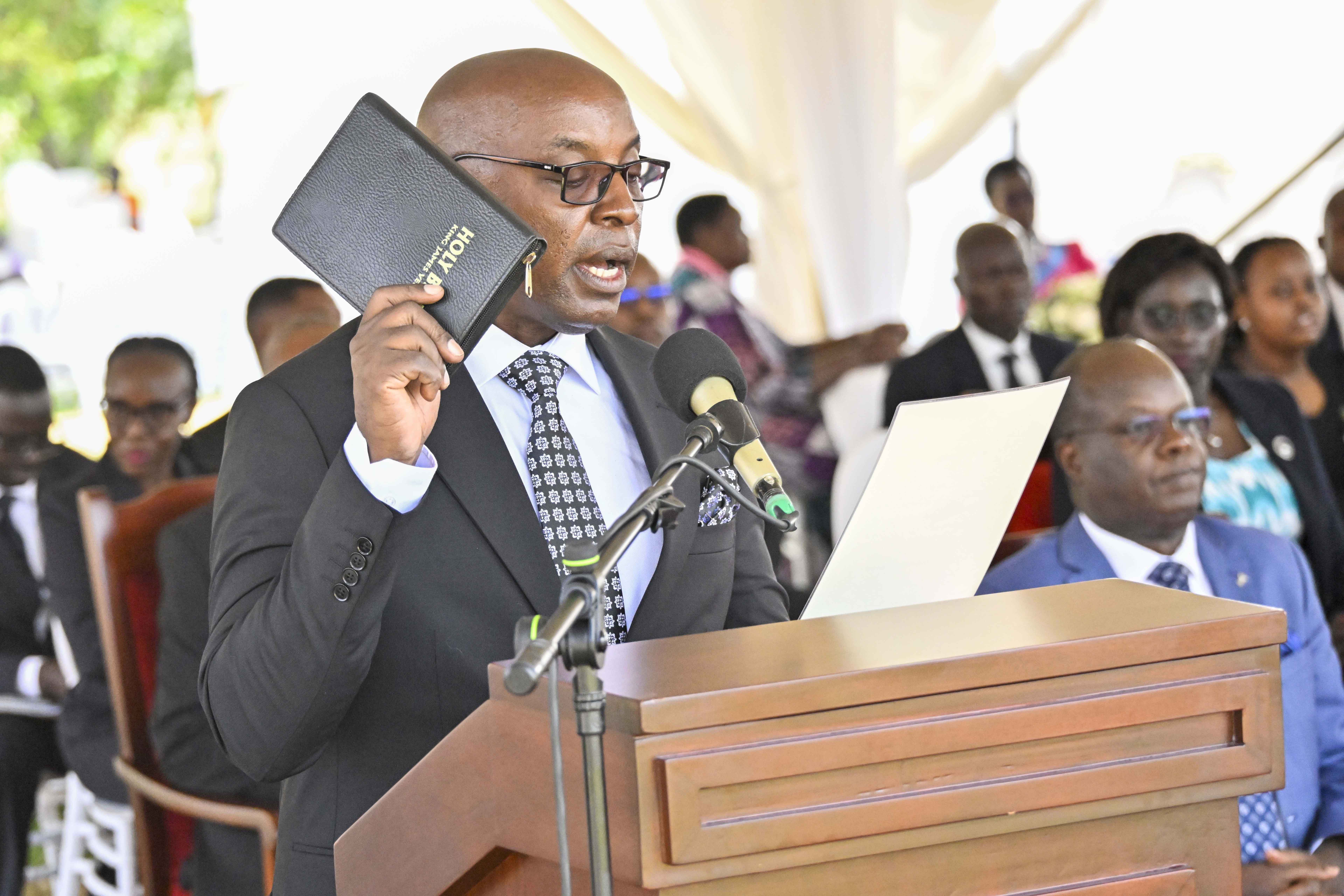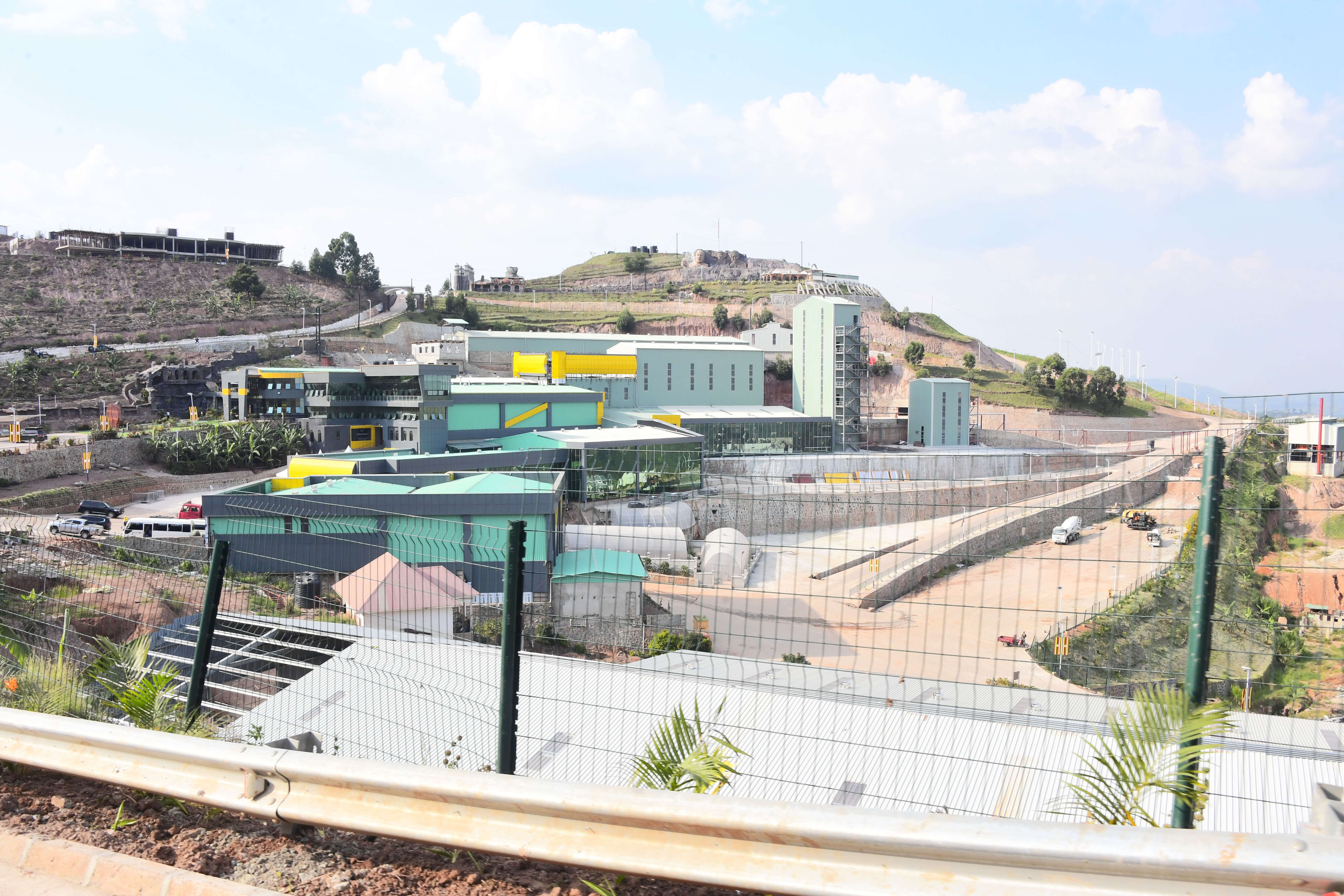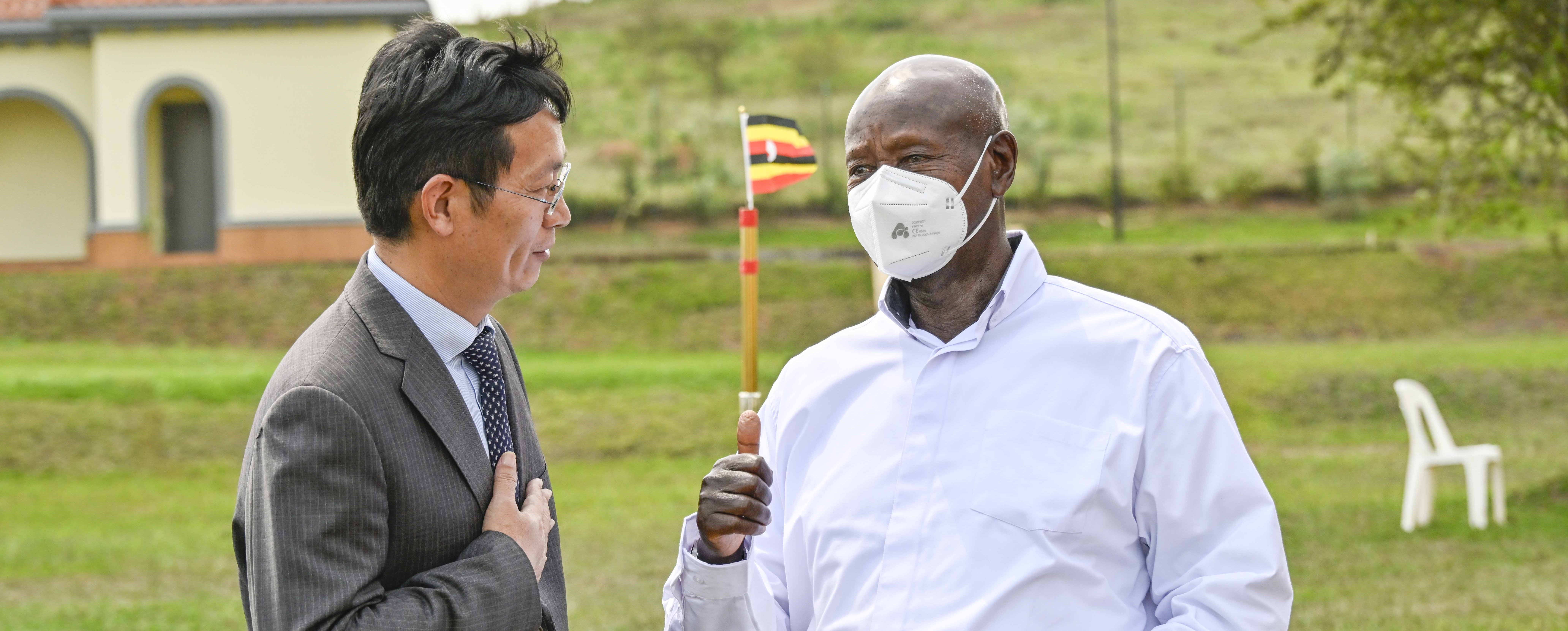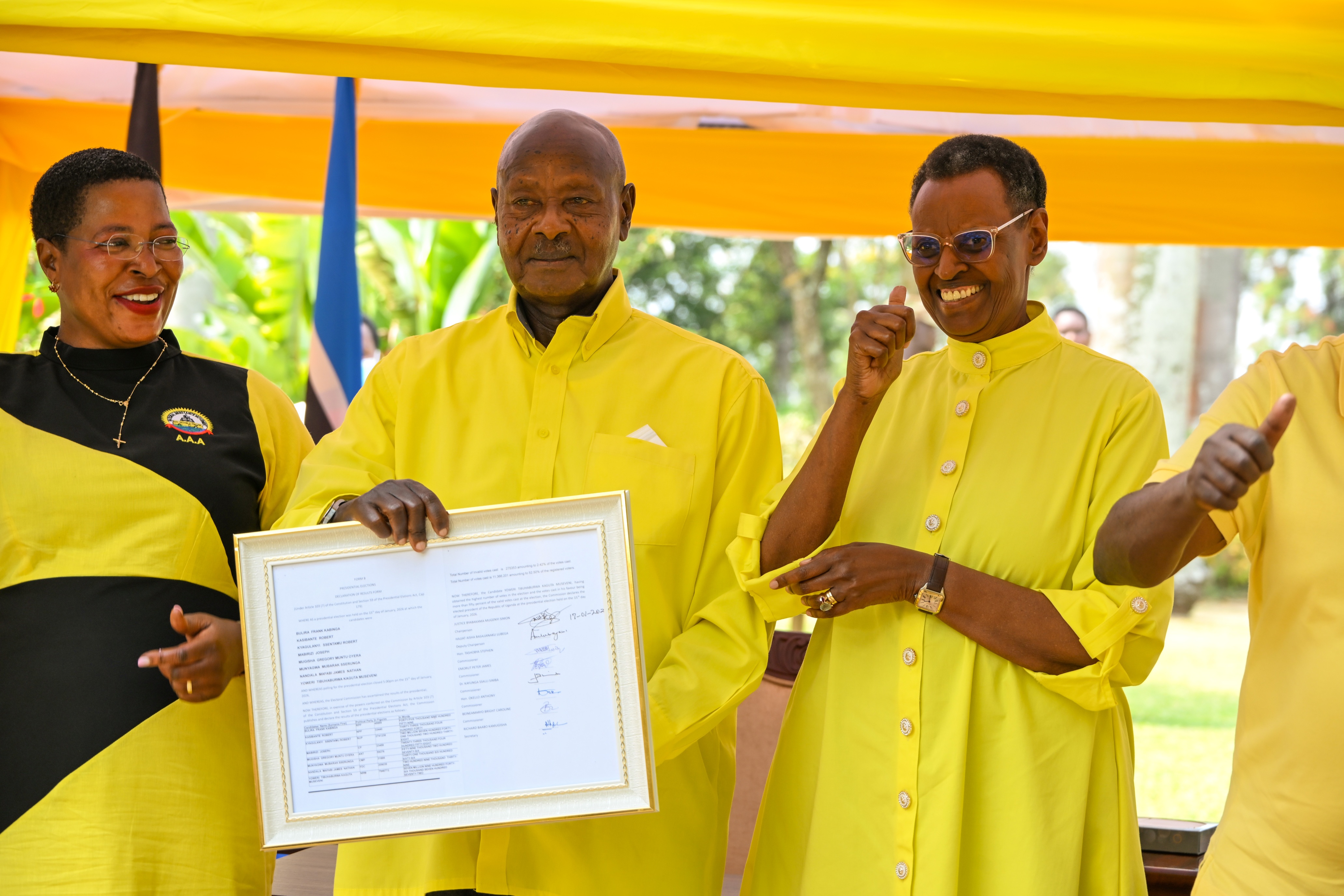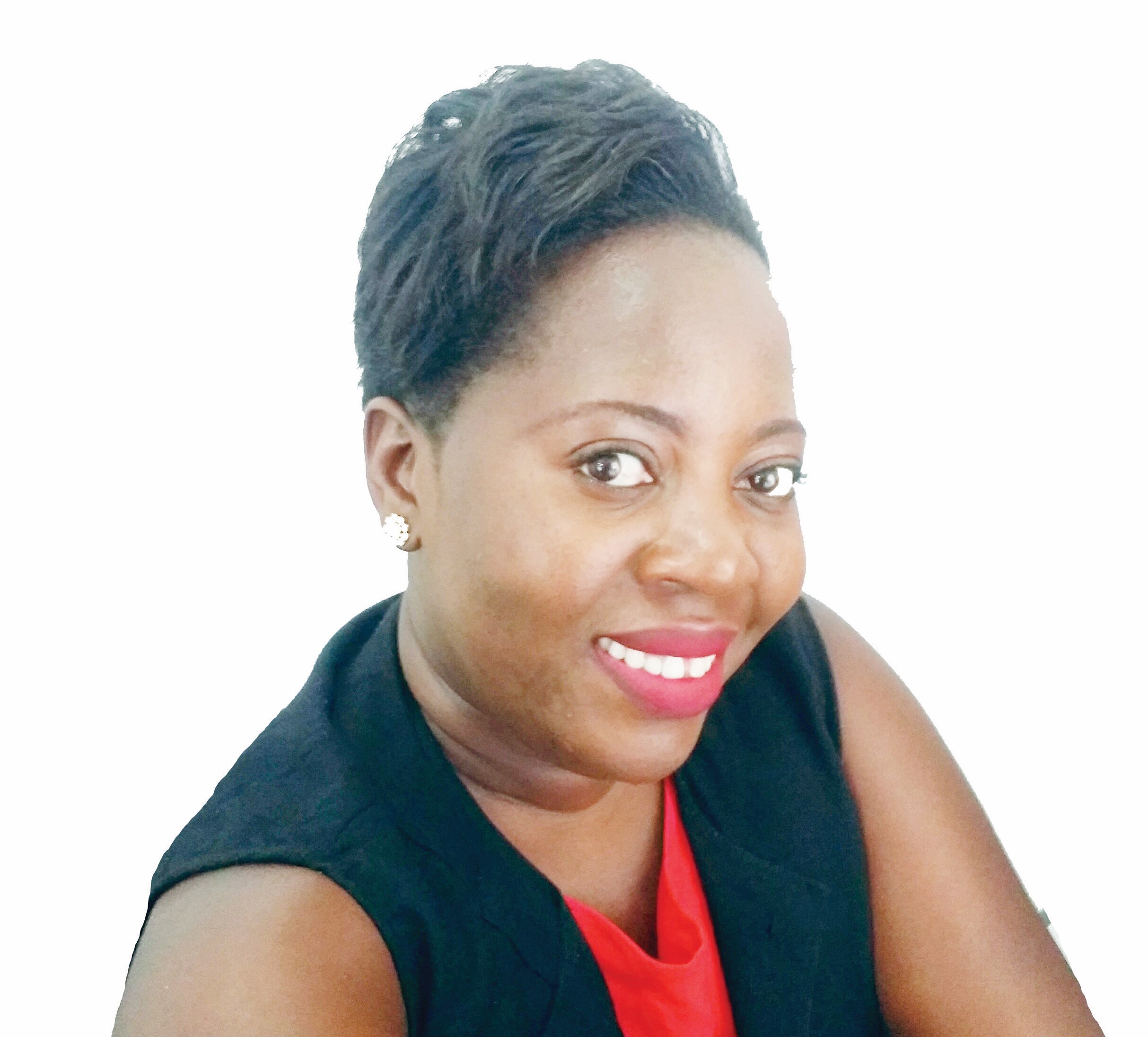PRESIDENT MUSEVENI RECEIVES OFFICIAL DECLARATION OF VICTORY, PLEDGES ECONOMIC GROWTH AND POVERTY ERADICATION
President Yoweri Kaguta Museveni has today formally received the declaration of his re-election as President of Uganda, pledging to prioritize poverty eradication, unity, and disciplined governance in the new term.
President Museveni, who won the recently concluded Presidential elections with more than 7 million votes according to provisional Electoral Commission figures, was officially presented with the declaration form by the National Resistance Movement (NRM) Central Executive Committee (CEC) at his country home in Rwakitura.
In his acceptance remarks, the President began by thanking God and the First Lady, Maama Janet Museveni, for her steadfast support.
“I want to thank God for this victory and for all the victories we have had over the last 55 years of struggle since 1971,” President Museveni said.
“I also thank Maama Janet for her support.”
He credited the win to collective effort, praising NRM members, party leaders, and institutions that he said played a critical role.
“I want to thank the NRM members and all the leaders because they all played a critical role in this victory,” he said.
The President also acknowledged the contribution of national institutions and community leaders, including the armed forces, religious leaders, and cultural leaders.
“I thank the armed forces for their role, the religious leaders for praying for us, and the cultural leaders for being responsive and working for peace,” President Museveni said.
Reflecting on voter turnout, President Museveni said a significant number of NRM supporters did not vote, a matter he said the party must study going forward.
“About 10 million of our people did not turn up. Many of them are our members, and we must find out why.”
He linked this reflection to what he described as a return to the founding principles of the NRM, emphasizing unity and stability, particularly in regions that had previously experienced conflict.
“That atmosphere of maximum unity is coming back,” he said, citing peace in parts of northern and eastern Uganda.
President Museveni highlighted government programs such as the Parish Development Model (PDM) and presidential skilling hubs, saying they have begun to restore hope among Ugandans.
“PDM has given people hope that we can get rid of poverty,” he said, adding that skilling hubs are equipping young people with practical abilities.
However, he acknowledged uneven implementation and said the government must critically assess what is working and what is not.
“We must analyze and find out,” he said.
On security, the President warned against what he described as isolated acts of violence linked to political extremism, while stressing that peace in Uganda is maintained not only by security forces but by citizens themselves.
“It is not just the security forces who are maintaining peace,” President Museveni said. “It is all Ugandans, including members of the opposition.”
He cautioned groups he accused of working with foreign interests to abandon violence.
“This is a free warning from me,” he said. “Stop what you are doing. We shall maintain peace in Uganda.”
Looking ahead to the new term, President Museveni outlined two broad economic priorities: supporting wealth creators to grow the economy and intensifying efforts to eliminate household poverty.
“For about 70 percent of the people in the money economy, we must support them to continue growing,” he said. “For the remaining 30 percent, this is where we must decisively address poverty.”
He said PDM funds are central to that effort, insisting that poverty must be eliminated at the household level.
“We must end poverty in the homesteads,” he said.
The President also emphasized the importance of free education in government schools, improved healthcare delivery, and strict action against corruption.
“Corruption annoys our people,” President Museveni said, calling on elected leaders to closely monitor government programs, including drug availability in hospitals, justice delivery, land protection, road maintenance, and water access.
“I will be very harsh in this Kisanja,” he warned.
On job creation, President Museveni said the focus would remain on agriculture, manufacturing, and the private sector, rather than public service employment.
Turning to regional integration and natural resources, the President said Uganda’s internal market is insufficient on its own and pointed to the East African Community as a critical economic opportunity.
He confirmed that Uganda’s oil production is expected to begin this year and said revenues would be invested in long-term national assets.
“Our oil will start flowing this year,” he said. “This money must be used for things that will last, like railways, power stations, roads, and science education.”
President Museveni cautioned against proposals to directly distribute oil revenues to local governments, arguing that oil is a finite resource.
“This oil will last about 20 years,” he said. “If you care about your country, you must use this exhaustible resource to build things that will endure.”
He concluded by urging unity and discipline as Uganda looks toward the next electoral cycle.
“If we do these things. We shall unite our people and build a stronger country.”
In her remarks, the First Lady and Minister of Education and Sports, Maama Janet Museveni congratulated the extended National Resistance Movement family for the party’s electoral victory, calling on leaders to remain faithful to God and recommit themselves to guiding Ugandans on the right path.
“I want to congratulate the extended family of the NRM,” the First Lady said. “I am deeply grateful to God for allowing this to be the first programme of this Kisanja, where we meet with the Central Executive Committee and the Secretariat to first thank Him, because only God made this possible.”
She said the gathering was an opportunity not only to give thanks to God, but also to appreciate the collective effort that led to the victory.
“God gives us the opportunity, and then we thank every one of you,” she said.
Reflecting on the campaign period, Maama Janet commended party leaders and mobilizers for standing firmly with President Museveni throughout the process.
“When I look at you, I remember that none of you left the President alone,” she said. “The contribution of each one of you made God’s divine purpose possible.”
The First Lady also expressed gratitude to President Museveni, the NRM Central Executive Committee, the Secretariat, and religious leaders across the country, saying their efforts were instrumental in guiding the nation.
“I thank the President himself, the CEC, the Secretariat, religious leaders, and above all, I thank God for His faithfulness,” she said.
In her closing remarks, the First Lady urged leaders to reflect, renew themselves, and continue serving with purpose.
“We must now re-educate ourselves,” she said. “If we do so, God will bless our efforts just as He did during these campaigns.”
The Vice President, H.E. Jessica Alupo called on Ugandans to remain grateful to God and united following the recent presidential elections, saying the outcome is a moment for thanksgiving and national reflection.
“On a day like this, we can only say glory be to God and thanks be to God,” H.E. Alupo said.
She thanked President Museveni for inviting them to listen to his address to the nation, describing the occasion as significant for the country’s democratic journey.
H.E. Alupo congratulated President Museveni, for what she described as an overwhelming victory in the just-concluded presidential elections.
“Allow me to congratulate you, Your Excellency, and Maama for securing an overwhelming victory. Congratulations,” she said.
The Vice President praised President Museveni’s resilience throughout the campaign period, noting that his leadership style helped galvanize support across the country.
“This is not the day to give a detailed account of the campaign, but Your Excellency demonstrated a very fatherly approach that brought together people from all walks of life across Uganda.”
She further applauded the National Resistance Movement Secretariat, led by the Secretary General, for working in a united and coordinated manner throughout the electoral process.
The Electoral Commission (EC) was also praised for delivering the election results peacefully.
“I would like to thank the EC for delivering the results in a very peaceful way,” H.E. Alupo said, adding that civic education efforts helped maintain calm across the country.
She thanked the people of Uganda for demonstrating unity and overwhelmingly backing President Museveni.
“I thank the people of Uganda for throwing their weight behind you, Your Excellency,” she said.
The Speaker of Parliament and NRM Second National Vice Chairperson (Female), Rt. Hon. Anita Annet Among congratulated the President on what she described as a well-deserved victory in the recently concluded general elections, citing strong public confidence in the ruling party.
“On my behalf, the NRM fraternity, and the people of Uganda, I want to congratulate you upon your win and this well-deserved victory,” she said.
She also congratulated the President and the party on the landslide performance in the parliamentary elections, noting that so far, 352 Members of Parliament have been elected under the NRM flag.
Rt. Hon. Among paid special tribute to the First Lady, Maama Janet for her role in mobilizing women across the country.
“We thank Maama for standing up for this country. As women of Uganda, we were energized. We left our homes, mobilized, and here is the victory we have achieved. No wonder most women turned up to vote.”
The Speaker said the declaration of the election results was a clear sign of the trust Ugandans have in the National Resistance Movement and in President Museveni’s leadership.
“Yesterday’s declaration is a testament to the trust that the people of Uganda have in NRM and in you, Your Excellency,” she said.
She commended the President for running a consistent and inclusive campaign, noting that he remained open to ideas from party leaders throughout the process.
“We thank you for your consistent campaign and for always accepting our ideas as leaders, whether to add value or improve our approach,” Rt. Hon. Among said.
She also praised the Central Executive Committee (CEC) and the NRM Secretariat, led by Rt. Hon. Richard Todwong, for strengthening the party’s campaign strategy.
“I thank the CEC and the Secretariat for the work you did,” she said. “No wonder we moved from 58 percent to 72 percent. You incorporated new ideas and made a real difference in the campaign.”
Speaking on behalf of the Parliament of Uganda, the Speaker thanked President Museveni for his continued support of the legislature and pledged Parliament’s commitment to work with the executive.
“On behalf of the Parliament of Uganda, we thank you for your support, and we pledge to continue working with you as one government for the people of Uganda,” Rt. Hon. Among said.
On the other hand, the NRM Secretary General, Rt. Hon. Todwong hailed the party’s performance in the recently concluded elections, describing the results as a clear demonstration of the National Resistance Movement’s strength as both a political party and a national movement.
He said the outcome reflected deep-rooted support for the NRM across the country.
“I can speak with pride that this percentage has demonstrated that the party has truly become a movement,” Rt. Hon. Todwong said.
He noted that the NRM performed strongly at all levels, particularly in local government elections, where the party secured the majority of leadership positions.
“At the local government level, we are winning across the board and we are well-positioned,” he said.
Rt. Hon. Todwong said the party’s success was the result of an inclusive campaign strategy that deliberately reached out to members at the grassroots, re-energizing the NRM base.
“We campaigned and reached out to every NRM member we could,” he said. “We saw that our base was awakened, and people responded.”
He paid tribute to President Museveni for heeding the call of party members to once again contest for the presidency, recalling that the appeal was made during Parish Development Model tours across the country.
“I want to thank you, Your Excellency, for accepting the call of your party members to contest. We remember asking you during the PDM tours, and you listened.”
The Secretary General also acknowledged the role played by the First Lady, Maama Janet, in supporting the party throughout the campaign period.
“Allow me to thank the First Lady, Maama, for always standing with us,” he said. “The support you give us encourages and strengthens the party.”
He concluded by reaffirming the Secretariat’s commitment to strengthening party structures and supporting the President as he begins a new term in office.
The event was attended by all members of the NRM Central Executive Committee (CEC), and several religious leaders, including Bishop Joshua Lwere, Pastor Robert Kayanja, Apostle Joseph Sserwadda, Bishop Nathan Ahimbisibwe, and the Rt. Rev. Alfred Muhoozi, Bishop of North Ankole Diocese.
2026-01-18


